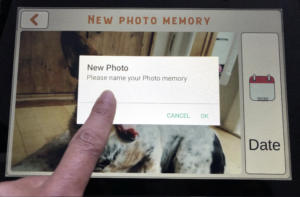
Memory Machine (MeMa) 3.0


The Memory Machine is an exciting ongoing Horizon funded project looking at how digital technology can support the preservation of memories. The Memory Machine app captures and records personal memories and then allows the user to contextualise these memories in a timeline with additional information, to create meaning behind the memory. This app has been developed with an interdisciplinary team of artists and experts in psychology, computer science, cultural studies, law and including, allowing different viewpoints of the experience to be considered, all with the end-user at the very centre of the design process. Such a device could be used in a variety of ways, including to support the memory and wellbeing of those with dementia and their carers, as a method to share memories with friends and family, as an end-of-life legacy, and as a tool for cultural heritage.
We want to explore the experiences of different potential users of the Memory Machine. We’re interested in different topics including the experience of uploading memories to the app, concerns around privacy and security when using such a device and exploring how memories may be gifted or shared with others through technology. We’ve already spoken with older adults who would feel comfortable using a device on their own, but now we want to hear from family members who may use this device to share memories with another family member or friend, and from older adults who may feel better supported if using the machine alongside someone like a spouse, carer, or family member.
If you think you may want to get involved, we’d love to hear from you!
You need to be someone who would use the Memory Machine app with a family member or friend to share memories, or an older adult who would be supported by someone to use the Memory Machine app. You need be based in or near to Nottingham to allow for delivery and collection of the Memory Machine and have access to a device that would enable you to join the online workshops.
There are three online workshops, lasting 1.5 hours each, that we’d invite you to join at a time suited to you. There will also be an opportunity to be included in an interview after the workshops have ended. You would receive a £60 voucher as inconvenience allowance for taking part in our workshops.
If you think you may be interested, or want to find out more, please contact Camilla.Babbage

In My Seat is recruiting…
We have created a mobile application designed to be used on your journeys around the campuses, which allows you engage with your local surroundings, by linking you to various types of content, including local information and user-generated content, through your specific journey.
We are looking for a group of people to test the prototype application and provide feedback on the experience.
This will involve
You will be thanked for your time with a £20 high street voucher.
The studies will begin in the week commencing 13th May 2019. For more information, and to register your interest, please email Dr Liz Dowthwaite.
Please note that to take part you must have an Android phone running at least version 4.4 (KitKat).
This was a presentation I gave internally to the Horizon research team on the development of the Chronicle platform. Of course it’s missing the audio but I’ve attempted to annotate the slides with enough information to give a flavour of the meaning.
Links
Dominic Price, Research Fellow, Horizon Digital Economy Research